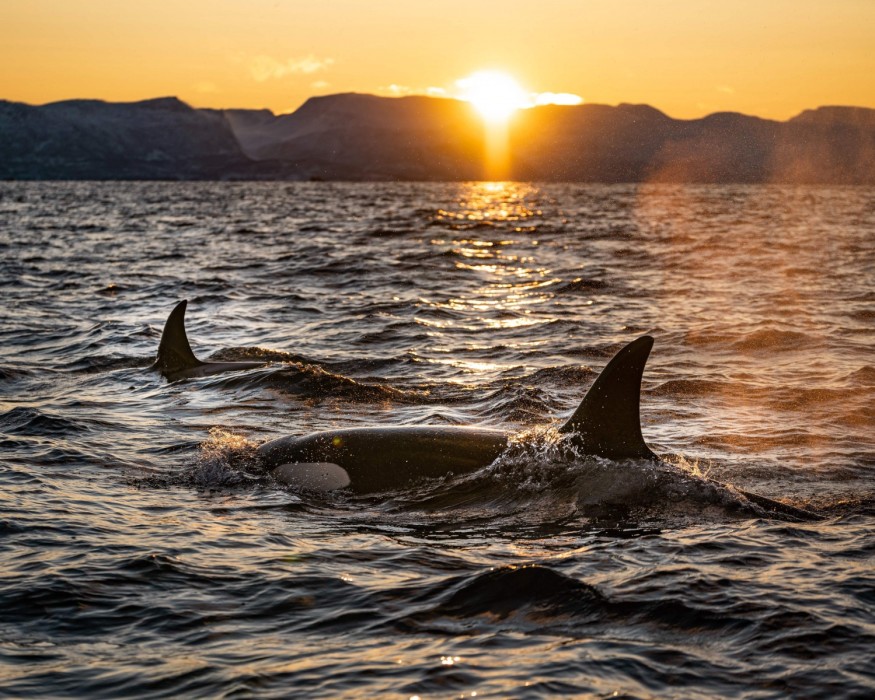A new study showed that sharks have been avoiding regions of the Gansbaai coast in Cape Town, South Africa, because of a pair of killer whales that have been attacking great white sharks. The South African shore is famous for the abundance of sharks until the last five years, when experts noticed a significant decrease in their numbers.
Around eight great white shark carcasses mysteriously washed up on the beaches of the Western Cape in 2017 all had their livers removed and some no longer have their hearts. Researchers said those wounds were signature attacks from the two killer whales.

Orcas Feeding on Great Whites in South Africa
The study, titled "Fear at the Top: Killer Whale Predation Drives White Shark Absence at South Africa's Largest Aggregation Site" published in the African Journal of Marine Science, was carried out for five years tracking 14 sharks fleeing when the pair of orcas are present in Western Cape.
Gansbaai coast is located around 60 miles east of Cape Town and is world-renowned as a great white shark hotspot, attracting tourists. But since 2017, researchers have found that sharks in the area are getting fewer.
Study lead author Alison Towner and a senior shark biologist told Newsweek that there were killer whale tooth impressions on the pectoral fins of the shark carcasses washed ashore. Also, there are sightings of killer whales in the area whenever there are dead sharks, confirming that orcas are feeding on sharks.
They mainly target shark livers, which are large and fatty and the favorite food of orcas. Previous studies have shown that Canadian orcas selectively target lipid-rich species of salmon, which might explain their preference for shark livers.
Moreover, killer whales attack subadult great white sharks and conservationists are concerned that it could further affect the vulnerable shark population in the area and slow their growth.
ALSO READ : Evidence of Megatoothed Shark Attack on Whale 15 Million Years Ago Preserved in Ancient Tooth
Display of the 'Flight' Instinct of Sharks
Analysis showed that sharks would disappear for weeks or months in what seems to be a large-scale avoidance rather than individuals disappearing. Researchers compared it to the wild dogs in Serengeti in Tanzania when lion presence increased. That means the longer orcas frequent those sites, the longer great white sharks will keep themselves away from the area.
Science Daily reported that this is a display of the "flight" sense of the great white sharks for fear of being preyed on by killer whales. Interestingly, it triggers a rapid, long-term emigration en masse to the formidable predators when their own marine predators are nearby.
Understanding how large marine predators react to threats could help scientists understand the dynamics of coexistence with other predator communities and interactions between a predator and its prey.
Impact of Orcas Driving Great White Sharks Away
According to CNN, there had only been two instances when sharks were absent on the Gansbaai coast. The first instance was for one week in 2007 and three weeks in 2016. That makes the absence of great white sharks in the site an unprecedented event that changes the ecosystem in the area.
Towner emphasized that balance is crucial in marine ecosystems. Without great white sharks, there will be more seals that can prey on critically endangered African Penguins and there will be no competitor for small pelagic fish. She explained that it is a top-down impact and bottom-up trophic pressures from
"That's a top-down impact, we also have 'bottom up' trophic pressures from extensive removal of abalone, which graze the kelp forests these species are all connected through," she added.
Unfortunately, there is only so much pressure that an ecosystem can handle, and the impacts of orcas driving sharks away most likely have a wider effect.
RELATED ARTICLE: Who's Responsible for the Disappearance of the Great White Sharks in Cape Town?
Check out more news and information on Sharks in Science Times.
© 2026 ScienceTimes.com All rights reserved. Do not reproduce without permission. The window to the world of Science Times.












